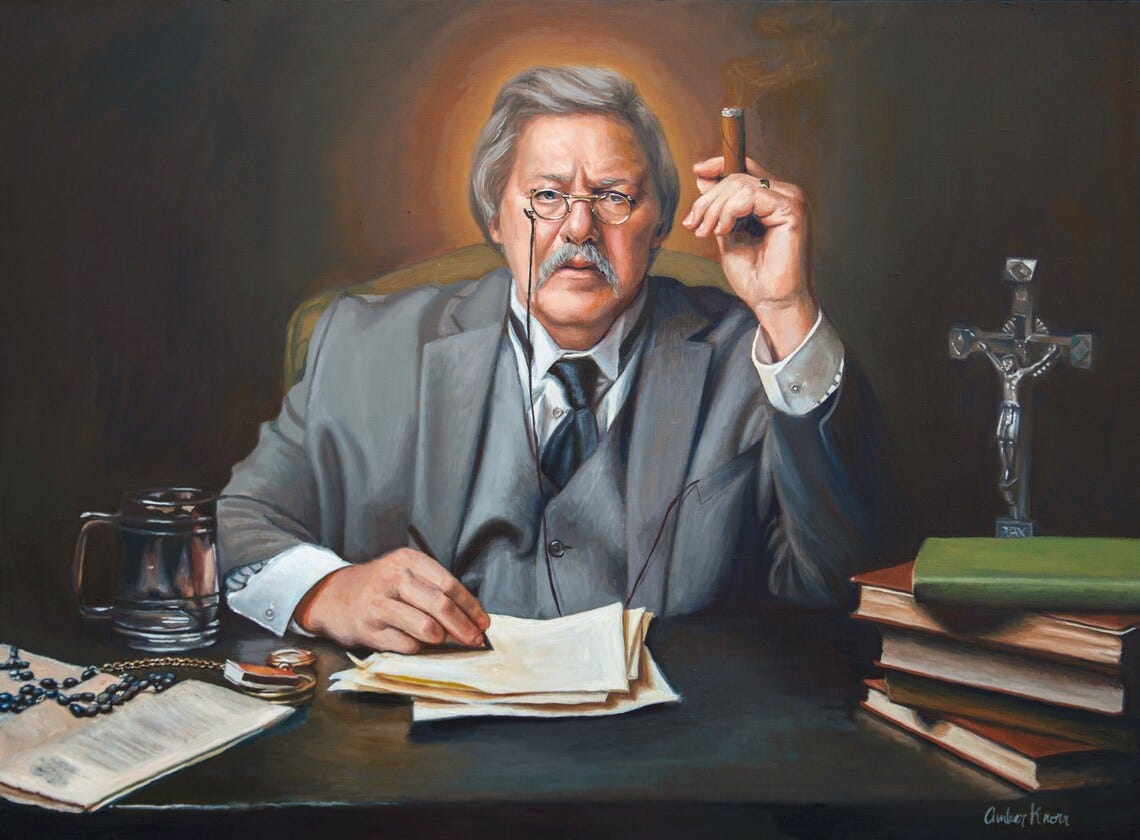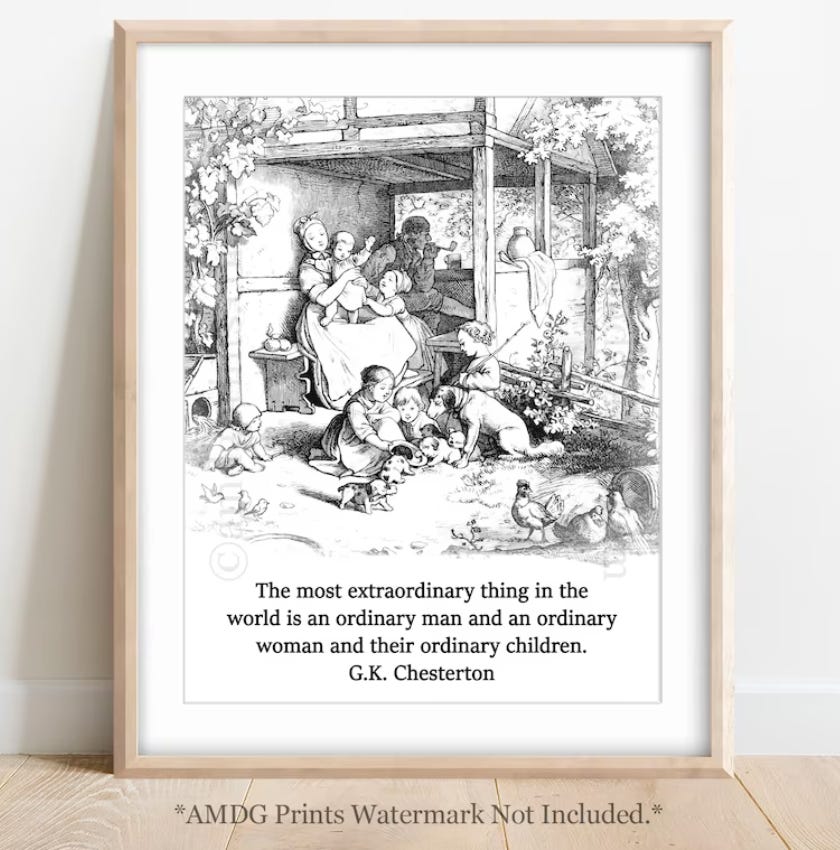The Third Tool: The Life, Writings, and Jokes of G.K. Chesterton
The life and writings of this ebullient Catholic convert and celebrity have much to say about Culture Recovery

A person can be a tool, when they consecrate themselves to our Lady. And a person in heaven can certainly be a tool. The life, works, and personality of Gilbert Keith Chesterton all fit this description aptly.
When Chesterton burst joyously onto the scene in the early 1900s to battle the sprouting weeds of socialism, promiscuity, birth control, government control, and pornography, his verbal sword rang with wit and precision. This overweight journalist convert to the Catholic faith tackled any topic that came his way: economics, modern lifestyles, divorce, poverty, Big Business, and even Big Media. He articulated principles of the Christian faith and the Catholic imagination that went on to influence (and convert) both C.S. Lewis and J. R. R. Tolkien. He answered the call of Leo XVI to explore economics beyond either communism or capitalism by wading into the waters as an amateur and laying the groundwork for what may someday be a Catholic approach to the economy. He penned aphorisms that ring with truth such as “if a thing is worth doing, it is worth doing badly,” “A live thing goes against the stream: a dead one goes with it,” “Theology is only thought applied to religion,” and many more.

If you’ve never heard of the man, you’ve probably been living under some sort of rock, and there’s really nothing wrong with that, especially if it’s been comfortable—but you really should get to know G. K. Chesterton.
Born in 1874 to a loving family, Chesterton display early genius and artistic promise, but his very open-minded parents raised him with no or little faith, encouraging him to choose his own ideals as he grew. As he observed later, "The purpose of an open mind is the same as that of an open mouth: to close it on something solid.”
This caused him to flounder as he approached adulthood. His childlike innocence was severely tested when instead of following his friends (Chesterton made and kept friends easily throughout his life) to college, he opted to go to the Slade School of Art during the height of the Decadent Period. And decadence among his teachers and fellow students was what he found: promiscuity, date rape, homosexuality, drug use, and Satanism. The young Chesterton was shaken, and while he did not fall into sin, he fell into depression, later entertaining the “thought that stops thought,” doubting his ability to reason or own existence.
Watching some of his fellows succumb mental illness, addiction, or suicide, Chesterton resolved to follow up on his parents’ invitation to discover his own creed. The one stipulation: it had to be a creed whose effect was to keep its believer sane. As he writes in his “slovenly autobiography,” Orthodoxy, the resulting quest to find the things that kept a man sane resulted in his discovering Christianity.
“I did try to found a little heresy of my own; and when I had put the last touches to it, I discovered that it was orthodoxy.” - Chesterton, Orthodoxy
The person possibly most responsible for saving his sanity was the woman he fell in love with, his wife Frances Chesterton. Paul Johnson commented that no marriage so completely secured a man’s place in history as Gilbert’s and Frances’. A quiet orderly woman, she managed his celebrity as his fame grew, kept him on deadline and going in the right direction, entered into his romps and flights of fancy (there are great photos of the couple in medieval dress at the reenactments of the day) and most importantly, “brought the cross” to Chesterton, as he later wrote. When the couple was unable to bear children, she compensated for this loss by opening their home to the neighborhood children (I was pleased to co-author a fictionalized account of one such friendship in this book). She also became a secretary to another pivotal influencer, educator Charlotte Mason, beloved of homeschoolers and “unschoolers” the world over. (Side note: I admire unschooling but I am far far too disorganized to do it. I am very grateful for structured curricula!)

Chesterton became a popular columnist, speaker, debater, poet, and novelist, but his entrance into the Catholic Church, at first against the wishes of his beloved wife, cost him professionally and personally. When asked why he became Catholic, he answered, “To get rid of my sins,” but later wrote a book explaining it (The Thing). Nevertheless he persevered in his faith, and rejoiced when his wife eventually followed him. His sudden death at the age of 62 in 1936 saddened the world, a local policeman at his crowded funeral remarking, “He was the king of this village, but he never knew it.”
Chesterton and Culture Recovery
What does Chesterton have to do with culture recovery? Chesterton was like a canary singing in the coal mine, detecting poison in the culture before anyone else noticed. His adolescent encounters with darkness primed him to recognize the spiritual powers entering the culture unobserved through arts and popular literature, and crystallized his thinking on them. Although he was famous as a debater, his refusals to debate are also notable. He refused an invitation to debate reputed Satanist Aleister Crowley (debate rests on having some common principle: in this case, there would have been none). And when it came to porn, Chesterton observed, “Pornography is not a thing to be argued about with one's intellect, but to be stamped on with one's heel.”
But despite all his battles, Chesterton rarely lost his cheerful temperament and never lost hope. Reading his observations on everything from family life to national elections, I have not only found wisdom but also recovered my spirits. C.S. Lewis, when he first discovered Chesterton as an unbelieving young adult, found in Chesterton an antidote to cynicism, commenting: “I loved him for his goodness.”
The only argument against losing faith is that you also lose hope – and generally charity. — Chesterton
Chesterton praised marital purity and childlikeness in an age slipping into darkness. And when you read him today, you can’t help laughing, and then thinking, and laughing again. Most of the grim battles we fight he was already fighting, sometimes prophetically. We have much to learn from this happy warrior, including how to take ourselves lightly, in order to fly as angels do. Chesterton argues:
Seriousness is not a virtue. It would be a heresy, but a much more sensible heresy, to say that seriousness is a vice. It is really a natural trend or lapse into taking one's self gravely, because it is the easiest thing to do. It is much easier to write a good Times leading article than a good joke in Punch. For solemnity flows out of men naturally; but laughter is a leap. It is easy to be heavy: hard to be light. Satan fell by the force of gravity.

In his life, in his work, in his thousands of columns, jokes, detective stories especially Father Brown, songs, poems, and what today would be called memes, Chesterton offers today’s Christians tool after tool after tool: everything from explaining the faith to clear thinking on difficult issues, to forming the imagination to celebrating the goodness of Catholic and human culture. His epic poems like The Ballad of the White Horse and Lepanto are each about battles for culture, but he also understood the need to be a happy warrior, and converted or least prayed for many of his fiercest opponents such as George Bernard Shaw or H.G. Wells. In today’s polarizing society, he provides a good role model for celebrities and influencers.

I confess it’s hard for me to talk briefly about a man whose writing was so instrumental in my rediscovery of my Catholic faith. But I’ve tried! You can learn more at The Society of G.K. Chesterton, which publishes the magazine Gilbert, or if you live overseas, check out some of the international Chesterton Societies.
And if you find your faith failing or cynicism slipping in, pray, read the Scripture, and read more Chesterton.






Regina, I could say that I like this post six ways from Sunday, but today is Sunday. One reason for delaying a while to read it is knowing in advance that it would set me trekking off into byways.
Where to begin? Best perhaps to clear the decks with a complaint - one that certainly reflects more on me than on Chesterton. I can only take him in small doses. When I try to read Chesterton straight on, the density of his apercus turns into a blur, and I lose interest. Here, for example, you give us one snappy - and utterly true quotation - at a time, and I delighted in each. But run them all together, and I lose the thread. Also, when run together, they begin to seem too pat.
Nonetheless, that said, Chesterton's knack for giving us deep truths in nutshells is amazing. Belloc, a contemporary of his I think, has a like knack, but generally in an easier narrative flow. Easier for me anyway.
Your overview here is just about perfect - complete, focused, succinct. Especially I liked: "marital purity and childlikeness in an age slipping into darkness." The book you mentioned co-authoring, The Chestertons and the Golden Key, is new to me, and fits right in there. I've put it in a TAN Books cart to order PDQ. I haven't known much at all about C's life story, and nothing about his wife, and thoroughly enjoyed the fit and fitness of what you told.
I'm sure you remember "The men of the East may spell the stars/ and times and triumphs mark,/ But the men signed of the cross of Christ/ go gaily in the dark." A sudden glimpse of Chesterton at the outset of Shadow of the Bear, lighting up motifs of heritage and schooling and warfare. After my second pass through Shadow, I tracked the quote down, and read the entire Ballad of the White Horse. It seemed and seems to me a thread through much of your work. Actually, when I think about it, it seems consonant still with what you're up to in these Recovery Journals..
Much later, when I began to read Michael D. O'Brien, I encountered the same white horse - the Uffington hill figure of a white horse dating from Alfred's astonishing defeat of the Danes - set as a neo-pagan lure in Anne Delaney's childhood at the beginning of O'Brien's "Strangers and Sojourners." It struck me - surprised me! - as a similar, subtle announcement of underrunning spiritual struggles.
Chesterton again, telling us what kind of story we are in. A bell sounding early in the work of each of my two favorite novelists. Go figure.